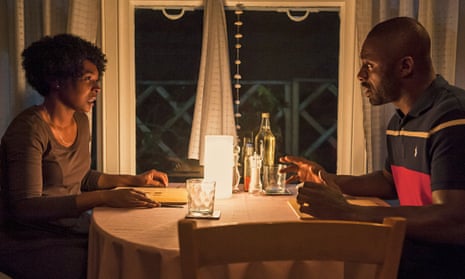Miracles may be an everyday occurrence, but in a secular age they can be less of a blessing than a curse. Films as diverse as Carl Theodor Dreyer’s Ordet, Denys Arcand’s Jesus of Montreal and, more recently, Dietrich Brüggemann’s Stations of the Cross have wrestled with the anachronistic intersection between the domestic and the allegedly divine, with results ranging from comedy to tragedy. In terms of subject matter, playwright Debbie Tucker Green’s beautifully ambiguous debut feature perhaps bears comparison with Richard Glatzer and Wash Westmoreland’s 2006 oddity Quinceañera (aka Echo Park LA), in which a Mexican-American girl approaching her 15th birthday discovers she is pregnant, despite her certainty that she is still a virgin.
In Second Coming, Jackie (Nadine Marshall) is a middle-aged mum with a history of miscarriages whose family life is thrown into turmoil by the prospect of another child. For Jackie, her much-loved 11-year-old son, JJ, (Kai Francis Lewis) is a miracle in his own right. Yet the prospect of another pregnancy raises the spectre both of traumatic maternal loss and of marital estrangement from Mark (Idris Elba), with whom she has not been intimate for some time. Is Jackie’s silence on the subject of her conception a symptom of denial, deceit, derangement – or something altogether more mysterious?
In a highly nuanced central performance, Marshall is both engaging and evasive, perfectly matching the fluid tone of Tucker Green’s enigmatic urban parable. Scenes of adroitly observed dinner-table domesticity sit alongside surreal episodes in which holy water (baptism or deluge?) falls upon the mother-to-be in what may be a dream, a fantasy or a “vision”. Brilliantly, this increasingly tempestuous theme is introduced in a manner so mundane that at first we think it’s nothing more than a problem with the plumbing. Only when the water starts to sweep dramatically across the screen do we appreciate that something otherworldly may be at hand, although whether this is all in the head or the heart of a tormented soul is left for us to decide. More than once I was reminded of the indefinability of Carol Morley’s The Falling, with its almost subliminal flashes of Jungian interactivity, a hive-mind existing beyond time and space, scratching at the edge of our subconscious.
None of which is to suggest that Second Coming should be seen as a “supernatural” picture. Despite the title (which oddly conjures allusions to such horror staples as Rosemary’s Baby and The Omen), Tucker Green’s film is more a meditation upon the life-changing effects of pregnancy and the hopes, fears and anxieties that attend any birth. To this end, young Francis Lewis does a wonderful job of hinting at JJ’s only-child fears of an interloper, while Elba captures the disorienting rage of a husband impotently shut out of his partner’s affections with sinewy conviction.
The narrative may nominally pivot upon the provenance of the unborn child (a question that the screenplay, like its protagonist, refuses to discuss), yet Tucker Green is clearly more interested in the familiar interpersonal tensions that are as immediately recognisable as those of a Mike Leigh film. Having earned her spurs in both theatre and television (she adapted her stage-play Random for Channel 4 in 2011), this versatile writer-director knows how to draw natural performances from her cast, the playful musical lilt of her dialogue giving way to bouts of resonant silence. There’s also a touch of Ken Loach’s Kes, not just in the overlapping conversations but in a fluttering subplot about an injured bird that comes to signify much more than just fragile dreams or nurturing instincts. In the absence of angels, this flightless creature is the closest the film comes to playing its theological hand.
Moving from the tight confines of the family home to more expansive verdant exteriors, cinematographer Ula Pontikos keeps her focus tight, lending a dreamy expressionist edge to the interior lives of these complex characters. Composer Luke Sutherland provides psychodramatic ambient scene-setting, while sharp music and sound edits highlight the isolated experiences of family members, reminding us that multiple realities coexist in even the most everyday circumstances. Yet at the core of all this strange magic is a trio of utterly believable performances that draw us into the bosom of this family, making us care deeply about their hopes and aspirations. The story may be elusive but the film’s human heart is bold, striking and tangible.

Comments (…)
Sign in or create your Guardian account to join the discussion